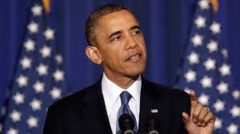As the crisis in Syria intensifies, riveting the world, the United States appears to have painted itself into a corner.
A year ago, President Barack Obama explicitly warned Syria that the use of chemical weapons against its citizens would represent an intolerable “red line” for the United States. Yet Washington has done remarkably little since then to back up his tough words with action.

And now that Washington has “clear” and “compelling” evidence that the Syrian regime was in fact behind the Aug. 21 poison gas attack in the suburbs of Damascus that claimed the lives of more than1,400 civilians, including some 400 children, the United States seems to be vacillating yet again.
The Syrian Baathist regime, fighting a bitter civil war against a diverse coalition of rebel groups, has exerted brute military force to crush its foes. From the moment the initially peaceful Arab Spring rebellion broke out in Syria more than two years ago, much to President Bashar Assad’s utter surprise, he has steadily escalated his response.
Treating the mainly Sunni rebels like foreign invaders and always referring to them as “terrorists,” the Shiite Syrian regime, backed by Russia, China, Iran and Hezbollah, has unleashed all the power at its disposal in an effort to defeat them. The army has used its arsenal of tanks, artillery and missiles, while the air force has deployed its most sophisticated jets and helicopters.
This fierce and increasingly sectarian war of attrition, which is tearing the country apart, has claimed the lives of at least 100,000 Syrians, has displaced fully one-third of Syria’s population and has driven out about two million Syrians, creating a disastrous refugee problem in neighboring countries like Lebanon, Jordan and Turkey.
Six months ago, in a scathing report, Amnesty International accused the Syrian government, as well as the rebels, of committing war crimes. Amnesty researchers concluded that the regime has indiscriminately shelled and bombed civilian residential areas, flattening entire neighborhoods.
Amid this carnage, the Syrian government – a police state that has never tolerated genuine political dissent and whose human rights record is appalling – has not been hesitant to violate international norms and conventions and resort to chemical weapons.
By all reliable accounts, Syria has used toxic agents like sarin gas to gain a battlefield advantage, while cynically and consistently blaming the rebels for launching such attacks.

In July 2012, Obama warned Assad he would be held accountable by the international community” if he made the “tragic mistake” of deploying chemical weapons.
Ratcheting up his rhetoric, Obama subsequently issued an even stronger message. As he resolutely put it, “We have been very clear … that a red line for us is (if) we start seeing a whole bunch of chemical weapons moving around or being utilized.”
Reacting to Obama’s speech, the Syrian government claimed that chemical weapons would be used only in the case of foreign intervention in Syria.
Be that as it may, Syria flagrantly flouted Washington’s warning, prompting the Obama administration in March to accuse Syrian forces of deploying chemical weapons “on a small scale against the opposition multiple times in the last year.”
Nevertheless, the United States did not punish Syria militarily. Beyond promising to supply non-jihadist rebels with small arms, a promise that has yet to be fulfilled, Obama stood back from the fray.
In the current and still unfolding crisis, the Obama administration has wavered, displaying both hard talk and confusion.
On Aug. 27, administration officials let it be known that the president was considering a punitive strike to “deter and degrade” Syria’s ability to launch chemical weapons, but emphasized that it would be “limited” in scope and duration and would not be designed to topple Assad
A day later, having whipped up an atmosphere bordering on war fever, Obama recoiled, saying he had yet to make a decision about military action, and adding that a U.S. strike would be a “shot across the bow.”
On Aug. 29, following a stunning vote in the British parliament that prompted Prime Minister David Cameron to rule out the possibility of Britain’s participation in a strike, Obama pressed ahead.
Reiterating he was ready to attack Syria without United Nations authorization, he described Syria’s actions as a double-barrelled threat to American interests and the interests of U.S. allies in the Middle East like Turkey, Israel and Jordan.
Reports in the media suggested that Obama would go ahead with a strike without significant consultations with Congress, a precedent he set after deciding to join a NATO bombing campaign to depose Libya’s strongman, Moammar Gadhafi.
Last week, U.S. Secretary of State John Kerry stepped up the rhetoric, accusing Syria of crimes against humanityand likening Assad to Adolf Hitler and Saddam Hussein, while adding that the United States had no intention of adopting a “boots on the ground approach” in Syria.
At this juncture, war seemed imminent.
But the next day, in an astonishing volte-face that heartened Assad and his allies and tarnished the United States’ credibility as a superpower, Obama said he would not proceed without authorization from Congress. “I’m prepared to give that order,” he declared in a reference to military action, but not before Congress convenes on Sept. 9.
With the Iraq war still casting a long and ominous shadow over a war-weary nation still stuck in the muck of Afghanistan, Obama feels the need to share responsibility with Congress for launching a war in Syria. Keep in mind that his predecessor, George W. Bush, went to war in Iraq in 2003 only after Congress’ approval.
Although Obama has slammed the brakes on an immediate strike, the option remains very much on the table. It is inconceivable that the United States would now back away from such an operation.
For the United States, failure to act would be nothing short of catastrophic.
It would represent a tremendous blow to American prestige, influence and power. It would embolden Syria, Iran and Hezbollah, at the expense of Israel, Jordan and Turkey, all of which support the Syrian insurrection. It might even convince Israel to embark on a unilateral attack on Iran’s nuclear sites, despite Obama’s assurance to Prime Minister Benjamin Netanyahu on Aug. 31 that the United States remains committed to the objective of stopping Iran from joining the exclusive nuclear club.
Assuming that the United States intends to hit Syria, Russian and Chinese objections notwithstanding, the questions that beg an answer are clear. Will the United States and its putative partner, France, be satisfied with merely pinprick surgical bombing raids that leave the Syrian regime basically intact? Or will they go for the jugular in an attempt to degrade Syria’s military infrastructure and superstructure?
Citing NATO’s 78-day air operation in Kosovo in 1999, which yielded tangible results, Turkey’s prime minister, Recep Tayyip Erdogan, once Assad’s ally, has called for a sustained bombing campaign. “It can’t be a 24-hour hit-and-run,” he said on Aug. 31 in Ankara.
Erdogan is right.
Washington’s strategic goal should be to weaken Syria to such an extent that non-jihadist rebels can finally turn the tide in the civil war. At the end of the day, only the rebels can and should remove the noxious Assad clique.
Hezbollah and Iran have both threatened to retaliate against Israel should the United States launch a major operation. Washington should call their bluff and do what it must in Syria.
As for Israel, it can defend itself and rise to the challenge of dealing with Hezbollah and Iran, whose malevolent influence must be drastically curbed.